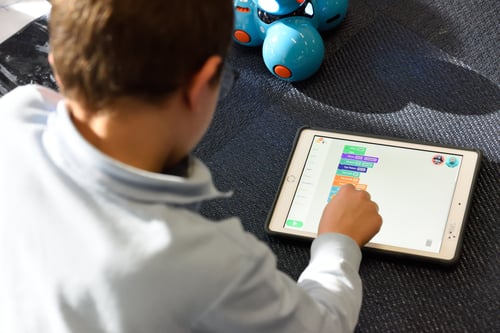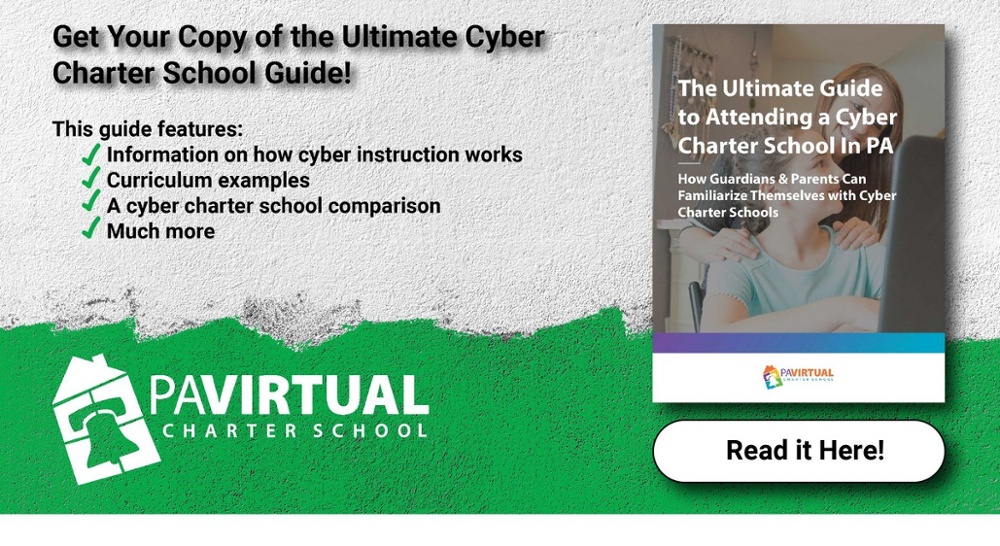Families considering online school often have questions about their options, the flexibility of programs, work load, socialization, and more. In this blog, Cindy Dingeldein, a Parent Ambassador coordinator and former PA Virtual parent, shares some of the important things you need to know about online education!
The term “online learning’ has many names and facets: cyber learning, cyber school, virtual learning, cyber charters, distance learning, homeschool online, and massive online open courses (MOOCs).
These titles have been given to both secondary education programs and kindergarten through 12th grade learning, but while these platforms began to develop fully in the late 1990s, around the world there were programs in existence before that time for college students only.
We have seen advertisements for university online learning for several years. But what are your options, particularly for parents in Pennsylvania? In this post, I’ll save you some time and share important things you need to know about online school, why people choose virtual learning, and share some of your options — including cyber charter schools!
Need to Know #1: You Have Options
Online school takes many different forms!
Cyber Charter Schools
Cyber charters in Pennsylvania are genuine public schools that deliver their content online, and are funded by taxpayer dollars, which makes them tuition free. Instructional time requirements for cyber charters are similar to traditional brick-and-mortar schools, as determined by the PA Department of Education. They also have to seek charter renewal every five years, a process that requires a thorough review.
Some of Pennsylvania's 14 cyber charters have operated for more than 20 years, and have risen in popularity in recent years. They often require a parent or responsible adult’s participant during the school day. Many, such as PA Virtual, offer both in-class and outside socialization opportunities, such as virtual clubs and activities, face-to-face outings, and more!
Private Online Schools
Private online schools are often offered as nationwide, or even global, programs. These tuition-based options mean the family incurs cost. Some online high schools, such as Pearson Online Academy, write that “our accredited college preparatory program gives students the flexibility to focus on their interests and learn from anywhere in the world with a high-quality curriculum that meets rigorous U.S. education standards.” Some online academies, such as eAchieve Academy in Wisconsin, accept out-of-state residents at a tuition cost.
Online Homeschools
Much has been discussed for several decades concerning schooling at home. There are now homeschool cyber curricula families can purchase. ABCMouse, Khan Academy, and Connections Academy are some of the top digital homeschooling options, but many programs do require a parent to coordinate and facilitate the learning, and may not have access to a live, teacher-led instruction.
Local District Cybers
During the COVID-19 pandemic, cyber learning became a necessity in local public districts, as buildings were closed in hopes of slowing or stopping the pandemic. As such, schools pivoted to a form of online instruction as a way to continue their students’ learning. Because districts had to build working platforms within days to weeks, many families and teachers had difficulty transitioning to this new, in-progress model.
Currently, some local school districts have maintained their online school platforms, but in the 2021-2022 school year, others discontinued this option once face-to-face education returned.

Need to Know #2: Online Schools Offer Flexibility — and Safety
One of the greatest advantages of an online education is flexibility. It often combines both synchronous (scheduled “live” classes) and asynchronous (working on your own outside the classroom) instruction, allowing students to work at their own pace in many subject areas.
For example, cyber charter schools are required to follow the instructional hours set by the PA Department of Education, but in a model that allows for more concise instruction and class time. Without hallway travel times, the same type of homeroom, and study halls, students are able to move through their online day more efficiently.
In busy families with students pursuing specific passions and career goals — such as those training for professional athletics, taking theater or music scholarship while also in school, and more — online schooling provides a way to thrive in education while preparing for their future. Cyber education can also benefit both gifted learners needing to move at a quicker, more advanced pace, as well as those who need some extra assistance. Plus, online education cuts down on commute time, family scheduling, and logistical challenges!
Another major benefit of virtual instruction is safety. For many students across the state, bullying has become an issue, and cyber schools provide a safe environment where children can learn. For students with medical concerns that make attending a brick-and-mortar school a challenge, online learning becomes a perfect match that allows them to pursue education while not compromising their health.

Need to Know #3: It Requires Work and Dedication
Sometimes people think that online schooling is easy, and doesn’t require children to work. This is far from the truth! When looking for an online program, a key component to address is academic rigor. Cyber charter schools, for example, also have to meet the academic standards and testing set forth by the PA Department of Education, just like their brick-and-mortar counterparts.
It also requires students to learn to take responsibility for their education and manage their school days, preparing themselves for what is coming in the years after graduation.
Virtual learning isn’t simply a child sitting in front of a computer all day, either! Students stay engaged through the usage of:
- Online classrooms
- White boards
- Teacher/student interactions
- Physical materials (for younger grades)
- Group projects
- Breakout room and activities
- and more.
They learn time management, writing, relational, and communication principles. Schools also participate in state testing, and some hold graduation ceremonies and optional field trips and group outings!
Let’s not forget family involvement! A number of cyber schools, including PA Virtual, require a dedicated adult to oversee student learning. This individual also sets up a work space, monitors materials, listens to student participation, provides encouragement, helps students follow their schedule, supervises assignments/assessments, and ensures all work is completed, reviewed, and passed on to the teacher as needed.
Need to Know #4: Students Still Socialize
Definition of socialization from Merriam Webster:
- (1a) the process beginning during childhood by which individuals acquire the values, habits, and attitudes of a society
- (1b) social interaction with others
There as a time in America where socialization was implemented by the family. In today’s world there are many avenues of socialization, from the time a child enters the world outside of the home. It is a common misconception (similar to ‘sitting in front of the computer all day’) that students receiving an online education have ‘zero’ socialization skills. But that is not at all the case.
Students in an online setting are socialized first by their immediate and extended family in the same way a student who attends a building is first socialized. Some online schools even have programming for parents, where they engage new parents each year by mentoring and assisting with technology, organization, relationship hurdles, and communication. Cyber schooling can offer the adult beside the student a plethora of learning benefits.
However, there are differences in how traditional vs. an online student grow in socialization:
| Traditional | Cyber |
| Automatic choice to participate in or try out for extracurriculars | PA cyber school laws state a student in an online school may participate in extracurricular activities sponsored by their local district. Families initiate this process. |
| Students/teachers are face-to-face | The quality of the software used by cyber schools often allow a teacher and student(s) to see each other. Teachers have the option of placing students in what is called a ‘breakout room,’ where they can chat, develop projects, complete worksheets, read together, enjoy meaningful discussions, learn acceptable online communication skills, and make friends. |
| A student sees and joins school clubs | School clubs are not new to cybers. From acting, writing, theater, animals, leadership, faith-based groups, crafting, music and art, you will find cyber schools are developing clubs each year across the state. National groups such as honor societies are available at the cyber levels. |
| Classroom field trips | Outings or field trips have been an ongoing delight in the cyber school setting. Parents have the opportunity to teach time management and delayed gratification skills to get to a monthly gathering. |
| Strictly adhere to schedule | The flexibility of online learning often allows a student to pursue a dedicated sport, community activity, educational opportunity or even employment, which continue to develop socialization skills. |
Need to Know #5: Online Graduates Go On to College, the Work Force, and More
Once upon a time there was a false rumor that students who were educated in the cyber world “never even received a diploma.” Graduating cyber students receive diplomas, awards, certificates, scholarships, grants, and more — just like their brick-and-mortar peers.
 Cyber schools use the expertise of guidance counselors, especially during high school, to walk alongside each student as they determine the next season of their lives. Cyber students are equally eligible for and recognized by universities, community colleges, the workforce, armed forces, and technical schools.
Cyber schools use the expertise of guidance counselors, especially during high school, to walk alongside each student as they determine the next season of their lives. Cyber students are equally eligible for and recognized by universities, community colleges, the workforce, armed forces, and technical schools.
Some online schools use software and digital tools to help students explore their interest and future plans. PA Virtual, for example, uses software called Naviance to help a student make those decisions. Beginning in ninth grade, each student can complete personality tests, aptitude tests, assessments, look at career options, and use filters to decide the various kinds of schools they may want to attend. Naviance also allows online college application and career assistance. Guidance counselors monitor progress in order to continue meaningful conversations with students as they continue in their high school years.
In addition, counselors provide optional and applicable sessions throughout the year for character and skill development as well as after graduation help. They help oversee scheduling in order for each student to successfully complete necessary graduation requirements. If early graduation is a possibility, the guidance department helps make decisions, monitors paperwork, and holds informational online sessions to assist students in the process.

Reflections from an Online School Family
For our family, online learning was the right choice. We decided first to attempt it in our daughter’s Kindergarten year. I had doubts about my role, but the curriculum was designed for online learning. Our teacher was remarkable, so my initial bumps in the road were solved and we moved ahead. Making a decision for first grade was simple — and I blinked, and suddenly we were at graduation!
Together we have many reasons why we stayed with online school, particularly PA Virtual:
- Excellent educational opportunity
- Schooling at home, but not home schooling
- Parents could see and hear what she was learning and conversations followed
- Loved the curriculum
- Socialization with our family values
- Quality families we met over the years
- Student and parent relationships with staff
- Outings/field trips
- No commute –we would have been first on and last off the bus, adding more than one hour to our school day
- School work was completed during the day – leaving open evenings for activities
- Our student wanted to stay at PA Virtual.
Students across the state of Pennsylvania have turned to an online setting for their education — and are thriving! Their new normal is to get out of bed, eat breakfast, turn on the computer, and arrive at class, without the commute. Yet they are still learning and growing as they interact with one another and their teachers. For some, this environment provides a safe haven where they can focus on education, rather than have to fend off bullies. Gifted students can work diligently at their own pace towards their goals, and students needing more one-on-one assistance can learn with support from their Learning Coach and school support.
Considering the switch to online learning? If a cyber charter school sounds like a good fit, then check out our Ultimate Guide to Attending a Cyber Charter School in PA!
 About the Author: Cindy Dingeldein is a former PA Virtual parent and currently works at the school as a Parent Ambassador Regional Coordinator. Her daughter, Lexi, attended PA Virtual for all of grade school, and graduated in 2017.
About the Author: Cindy Dingeldein is a former PA Virtual parent and currently works at the school as a Parent Ambassador Regional Coordinator. Her daughter, Lexi, attended PA Virtual for all of grade school, and graduated in 2017.
Images courtesy of stem.T4L , YY TEOH, Unsplash.





Comments